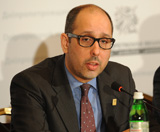An important part of the Association Agreement is the norms that can encourage European businesses to enter Ukraine and import their business culture. A number of provisions focus on the protection of European business from frequent pressure it has faced in Ukraine so far. If the Association Agreement is signed, European entrepreneurs will be first to point at violations, while the EU will be able to protect its business through its Association Council, using the tools the Association Agreement provides. Thus, European entrpreneurs whill have more confidence to come and work on the Ukrainian market.

Jorge Zukoski, President of the American Chamber of Commerce in Ukraine
With the third Eastern Partnership Summit in Vilnius approaching fast, discussions about signing of the Association Agreement and establishing the Deep and Comprehensive Free Trade Area (DCFTA) between the European Union and Ukraine become even more intense. Ukraine has not demonstrated yet the full commitment to fulfill all the requests that the European Parliamentarians have set before the country's leadership. Only two weeks left until this decisive event and the international business community represented by the American Chamber of Commerce in Ukraine remains cautiously optimistic about what future holds.
Our Members have always been strong supporters of Ukraine’s European aspirations and therefore have been actively encouraging the Ukrainian leadership to continue moving towards closer integration with Europe via the advocacy platform provided by the American Chamber of Commerce. Ukraine is yet to make a final decision on whether to commit and prepare for all the opportunities and challenges which business, the Government and civil society will face at the initial period of implementing the Agreement provisions.
If the Ukrainian leadership sticks to the European path, we do believe that the short-term difficulties would be just a normal stage on the way towards reaching the prosperity that European nations enjoy, and can be overcome by concerted efforts from all the stakeholders involved. International businesses believe that throughout the transition period, the most efficient means of reducing possible negative effect on the economy is, in the first place, a thorough study of the implications of the DCFTA for particular sectors and building very concrete plans while realizing the real scope of work and timeframes for implementing all necessary legislative, regulatory, and practical changes.
Our Members very much look forward to seeing the Association Agreement signed. We hope that results of the Summit will be in favor of Ukraine's integration and will continue building a broad and all-inclusive partnership of stakeholders from business, diplomatic, and expert communities to put in place an action plan from the very first day after the signing. One of our initiatives – permanently functioning DCFTA Implementation Advisory Center will become a great platform for intensive and productive discussions of domestic and foreign investors with the Ukrainian Government representatives and society at large. These efforts will result in providing practical recommendations for the Government on the most efficient ways for implementation of the DCFTA provisions, incorporating not only the letter of the EU law, but also the spirit of the EU law into the Ukrainian regulatory sphere. This initiative is driven and strongly supported by our Members and we invite everyone to get actively involved in analyzing what needs to be done in order to create conditions for enjoying all benefits of the EU–Ukraine Association Agreement, and move together along this crucial path.

Dario Marchetti, General Manager of Danone Ukraine
Danone Ukraine is very positive about the prospects of signing the FTA agreement. It will lead to the cancellation of export duties on many products, which will increase trade between the EU and Ukraine. But milk business is a local one, we use Ukrainian ingredients and sell packed dairy on the internal market, thus we don’t expect our export to grow remarkably. However, the overall quality of products in the country will increase as Ukrainian farmers will have to undergo many changes to improve their product to be able to export and sell it to European companies.
The biggest problem of Ukrainian milk industry remains private households on which producers rely as milk suppliers. If we talk about strict EU norms, the producer has virtually no chance to trace the way of the milk from the final product to the cow that produced that milk, the food the cow ate and the conditions in which it lives in Ukraine.
Farmers must be motivated to change and improve; they should make a good-quality product, not add water to the bucket, trying to sell “more” milk at a lower price. The tendency in Europe is to reduce the number of cows but increase their productivity. Just recently we organized an educational and practical seminar for Ukrainian farmers with specialists from Israel, where cows give 11,000 litres of milk, as opposed to 2,500-2,000 litres in Ukraine. Ukraine has ways to go, but it will cope with this. It is one of the countries where if you manage business well, you can produce milk at a lowest prime cost. So more players will get involved and competition will become even tougher but this is only to the benefit of a consumer.
Danone never compromises quality, we operate on equally high standards in every country, so we are ready for new standards and regulation. As a sustainable business, we will help our suppliers improve their performance in compliance with the EU standards. In 2010, we started developing milk cooperatives that revive villages, give them economic stimulus and can subsequently grow into farms. They will be the future source of growing demand for milk products.
 Oleksandr Tymofeev, Director General of AWT Bavaria
Oleksandr Tymofeev, Director General of AWT Bavaria
This is the first step towards the European Union which is the most civilized union in the world today that provides jobs and proper living standards to many citizens. It will also help improve the quality of goods thanks to the implementation of high standards. BMW Group trademarks we represent in Ukraine fully meet them. So, we expect, first and foremost, that business in Ukraine will become more civilized and predictable. If this scenario is realized, we will work sustainably and fill Ukraine’s budget. The association means huge prospects in the future for Ukraine
 Cornelius Granig, CEO of Siemens Ukraine
Cornelius Granig, CEO of Siemens Ukraine
In our opinion, Ukraine will benefit from the signing of the Association Agreement economically. It will open new markets for Ukrainian producers and provide them with many new opportunities. Another key benefit of the Association Agreement is facilitation of modernization at Ukrainian enterprises.
I have recently met with representatives of MetInvest, the Industrial Union of Donbas and DonetskSteel at a conference Siemens Ukraine held in Donetsk and Dnipropetrovsk. My personal impression was that they realize that once Ukraine signs the Association Agreement, it will get more access to loans from Western banks, and this is the money they need to upgrade their facilities. Once upgraded, the plants will produce and sell more to European countries.
A large portion of Ukrainian products goes to the Russian market today. This is because Ukrainian producers have few alternative options. The signing of the Association Agreement will help change this and expand opportunities for them.
This is one of the things we will discuss with the EU Enlargement Commissioner Stefan Füle and representatives of European business at the upcoming Eastern Partnership business forum before the official section of the Vilnius Summit.

Graziano Cameli, CEO of UniCredit Bank
I assume that the signing of the Association Agreement at the Eastern Partnership Summit in Vilnius – if it is signed there – will most likely be a sort of a starting point for the Ukrainian market. However, we should all realize that the signing is not enough. Both banks and investors need a clear agenda of reforms to be implemented, that will could protect the rights of creditors, ease administrative pressure and change the judiciary system.
 Taras Barshchovskyi, Founder of T.B.Fruit
Taras Barshchovskyi, Founder of T.B.Fruit
Most experts agree that the signing of the Association Agreement with the EU is a positive step for Ukrainian farmers since local agricultural produce will gain access to the European market of 500-600mn consumers. Moreover, they should be able to export their produce at a 0% or 0.5% duty in the first year after the signing.
The flagships of Ukrainian agriculture, including producers of grain, chicken and dairy products, are expected to be particularly successful on the European market.
However, not much is said about lower import quotas to the EU alongside lower duties. According to the Association Agreement provisions published officially so far, the quotas for grape and apple juice is 10,000t per year in net weight with a gradual increase to 20,000t annually. The conditions of this gradual increase are not disclosed.
T.B.Fruit is a leading Ukrainian producer, and one of the biggest suppliers of apple concentrate to Europe. Our capacity allows us to export at least 50,000t annually. So, we do not expect much benefit from the Association Agreement for our business. Instead, we get a controversial bonus: tense economic relations with Russia can make exports to Russia more difficult.
Still, we view this situation as a new challenge. Moreover, we have foreseen this “European” scenario and started to expand our business geographically in advance.
Overall, European integration is an important step for Ukraine that will determine its future. Its success depends on the efforts of businesses and sentiments in society, but, first and foremost, it depends on the national policy, well-though decisions and consistent actions of the state – the will to protect the interests of the entire economy, business and society, not individual players.

